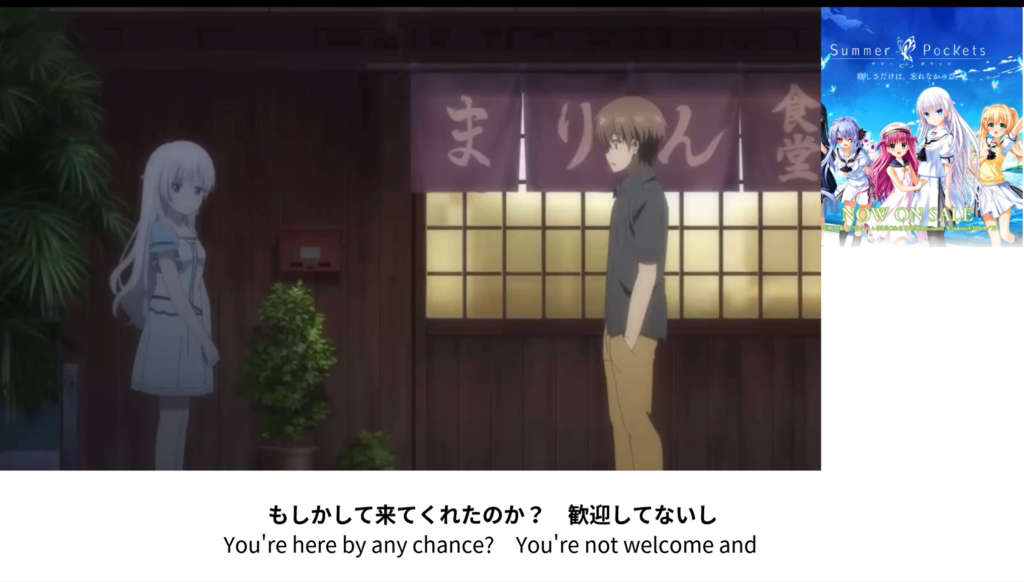Today's lesson is vocabulary and grammar explanation. After giving basic level vocabulary and advanced level vocabulary, I will give you a brief grammar explanation.
Standard Level Vocabulary ~0:50
Click on a word to open the dictionary.
| vocabulary | hiragana | pronunciation | meaning | POS |
|---|---|---|---|---|
| ずっと | ずっと | zutto | continuously, all along | adverb |
| 昔 | むかし | mukashi | old days, past | noun |
| 夏 | なつ | natsu | summer | noun |
| 忘れる | わすれる | wasureru | to forget | 2 verb |
| でも | でも | demo | but, however | conjunction |
| 覚える | おぼえる | oboeru | to remember, to learn | 2 verb |
| 行く | いく | iku | to go | 1 verb |
| 一緒 | いっしょ | issho | together | noun/adverb |
| 私 | わたし | watashi | I, me | pronoun |
| 意味 | いみ | imi | meaning | noun |
| 来る | くる | kuru | to come | irregular verb |
Advanced Level Vocabulary ~0:50
Click on a word to open the dictionary.
| vocabulary | hiragana | pronunciation | meaning | POS |
|---|---|---|---|---|
| 永遠 | えいえん | eien | eternity, forever | noun |
| 駆け回る | かけまわる | kakemawaru | to run around | 1 verb |
| いつの間に | いつのまに | itsunomani | before one knows | expression |
| 風景 | ふうけい | fuukei | scenery, landscape | noun |
| 確かに | たしかに | tashika ni | surely, certainly | adverb |
| 探す | さがす | sagasu | to search, to look for | 1 verb |
| ヒント | ヒント | hinto | hint | noun (loanword) |
| やる | やる | yaru | to do, to give (casual) | 1 verb |
| 島 | しま | shima | island | noun |
| 不思議 | ふしぎ | fushigi | mystery, wonder | noun/na-adjective |
| 蝶々 | ちょうちょう | chouchou | butterfly | noun |
| 昔話 | むかしばなし | mukashibanashi | folktale, old tale | noun |
| もしかして | もしかして | moshikashite | perhaps, possibly | expression |
| 歓迎 | かんげい | kangei | welcome | noun/suru verb |
| かまう | かまう | kamau | to mind, to care | 1 verb |
Grammar Explanation ~0:50
Study the important grammar in the video!
~みたいな: like ~ / similar to ~

「~みたいな」 is used to describe something that is similar to something else. It's like saying "like" or "similar to" in English. This form is casual and often used in conversation.
Structure: Noun + みたいな + Noun
Example: アイドルみたいな人が来た。
A person like an idol came.
行こ!: Let’s go!

This is a casual and shortened form of 「行こう」, which is the volitional form of the verb 「行く」 (to go). It is used to suggest going somewhere together in a friendly way.
Structure:
Verb (Group 1) → Change the final う sound to おう
行く → 行こう → 行こ!(casual)
Example:
映画見に行こ!
Let’s go see a movie!
Note: This is very informal and common in daily conversation, especially among friends.
探そうよ!: Let’s look for it! / Let’s search!

This is also a volitional form, used to suggest doing something together. The verb is 「探す」 (to search/look for). The 「~そう」 form is the volitional, and 「よ」 is added to make the sentence more encouraging or persuasive.
Structure:
Verb (Group 1) → Change final う sound to おう + よ
探す → 探そう → 探そうよ!
Example:
なくした本、探そうよ!
Let’s look for the lost book!
Note: The 「よ」 adds emphasis or friendliness to the suggestion.
来てくれたの? Meaning: Did you come (for me)? / You came, didn’t you?

This is a casual and warm expression often used when someone is surprised or happy that the listener came. It combines
「来て」: te-form of 「来る」 (to come)
「くれる」: to do something for me (shows kindness toward the speaker)
「た」: past tense
「の?」: used to seek confirmation or show emotion in a casual way
Structure: Verb (て-form) + くれる + の?
Example:
本当に来てくれたの?
You really came (for me)?
Note: This expression is emotional and often implies gratitude or surprise.
